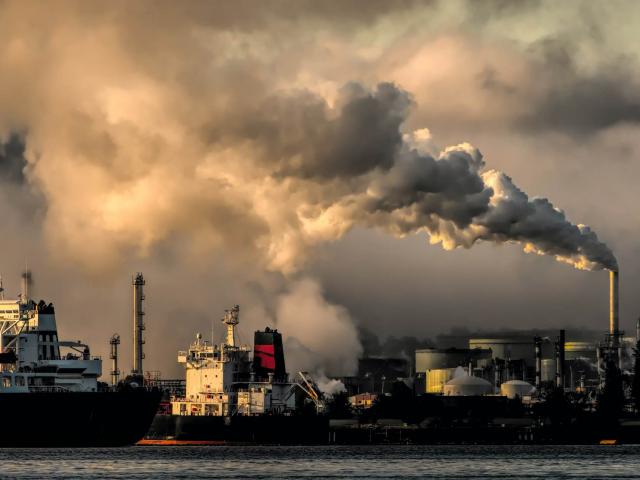
EIPR wins court ruling ordering Titan Cement to pay EGP 1 million in compensation for using coal in polluting air
News
The Egyptian Initiative for Personal Rights (EIPR) was handed a ruling on Monday, 29 April,from the Alexandria Court of Appeal ordering compensation to a resident of Wadi al-Qamar and his child for damages to their health caused by production in the the Alexandria Portland Cement Company (Titan Cement).
The court reached its verdict after it ascertained the company’s responsibility and that the health damages caused to the complainants resulted from the company’s use of coal as an alternative fuel to natural gas since 2015. The coal burning unit of Titan Cement is located just ten meters away from the Wadi al-Qamar residential area in western Alexandria, which violates the standards and conditions stipulated in the environment law and its executive regulations for coal burning.
The ruling was issued by Circuit 12 of Alexandria Court of Appeal for Civil Matters, in Appeal No. 3545/Judicial Year79, which was filed by EIPR against the judgment issued in Case No. 128/2018.
The ruling was based on the precedent set forth in the final and binding judgment that EIPR previously won in the Court of Cassation, proving the company’s fault. The court stated that the company, represented by its chairman, "did not take the necessary precautions to prevent the leak of air pollutants or reduce their quantity, nor did he take measures and precautions to produce hazardous materials in liquid or solid form, thus causing – by his mistake – harm to the victims [including the two complainants] as a result of negligence and failure to observe laws and regulations". This was consistent with the findings of the field report prepared by the forensic medicine department in Alexandria after examining EIPR’s client and his child. The report said the two complainants suffered from lung infections and chest allergies, which are chronic diseases that may be caused by continuous exposure to air pollutants. In the typical language employed by forensic reports the investigation “did not rule out that the factory (Titan) and the air pollutants it emits could be the main reason behind the complainants’ condition.
EIPR considered this ruling a progressive step by Egypt’s judiciary in handling environmental harm and ensuing civil damage cases Especially since previous forensic reports customarily do not decisively attribute the cause of damage to environmental errors thus allowing impunity of those who cause environmental pollution, and violating the rights of victims today and in future generations. EIPR emphasised in its litigation the wide scope of damage caused by environmental violations of this type as it affects the entire population and contributesto the acceleration of climate change.
On behalf of client Hany Abdel-Fattah and other residents of Wadi al-Qamar, EIPR had filed claims for compensation based on a complaint it filed in 2015 accusing Titan Cement of harming their health. The original lawsuit argued that the complainants, including those involved in the appeal, developed chest and respiratory diseases due to the air pollution caused by the factory’s emissions - the factory’s location being actually a few metres away from residences.. The Public Prosecution ascertained the validity of the complaints by inspecting the complainants' residences and conducting medical examinations on them at the Chest Hospital in Kom al-Shaqafa, Karmouz.
The original lawsuit, registered under No. 6645 of 2016 (Dekheila Misdemeanours), was filed against Titan Cement’s CEO in his capacity as the chief responsible party. It accused him of failing to take precautions and measures necessary to prevent or reduce the emission of pollutants into the air, as well as failing to take measures to produce hazardous materials in liquid or solid form, and causing harm to the victims – more than three in number – because of his negligence and failure to comply with laws and regulations. The court convicted him and ordered him to pay a fine of 20,000 pounds for each of the first and second charges, and 200 pounds for the third charge, which is different from the compensation ruled on in the present case.
The verdict became final with the issuance of the judgment in Cassation Case No. 14888/judicial year no.9 for cassation misdemeanours).
Last November, the Alexandria Court of Appeal issued a ruling ordering the defendant to pay Ms. Hanaa Abdullatif 750,000 pounds in compensation for the damage that Titan Cement caused to her, but the company filed a petition to suspend the implementation of the ruling. On 28 April, the West Alexandria Court rejected the petition. Ms. Abdullatif has now resumed procedures to implement the ruling.
Another circuit at the Alexandria Court of Appeal ruled in January to compensate Mr. Said Abdo El-Sayed Shwita, one of the other victims, and his two sons with 120,000 pounds.
EIPR applauded these rulings, which culminated a long legal process the victims went through with the assistance of EIPR lawyers in order to prove Titan Cement’s responsibility for environmental pollution and health damages. EIPR is hopeful that environmental litigation will continue to realise its potential as an effective and deterrent tool for improving the environmental performance of development projects, and for the protection of the environmental and health rights of all citizens.



